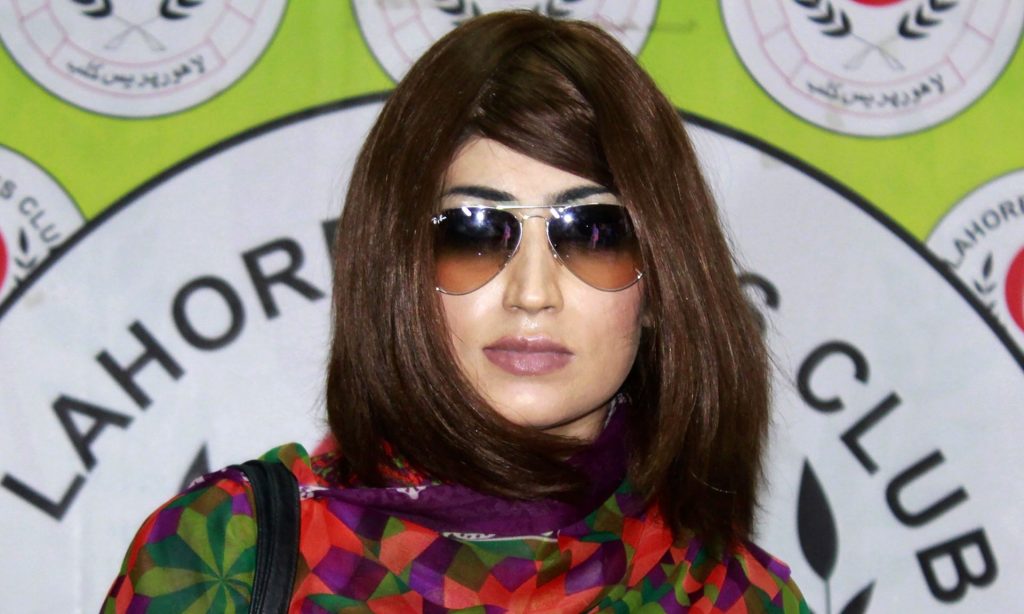
Photograph: STR/AFP/Getty Images
Even for a society brutalised by years of mass violence, the murder of social media celebrity Qandeel Baloch was shocking.
Perhaps it was the public nature of her life and the apparent social sanctioning of her death by the misogynist trolls who threatened her on Facebook. Perhaps it was the unapologetic manner in which she asserted her sexual autonomy, or her mockery of Pakistan’s clergy. Perhaps it was her open proclamation of her feminist ideals, or her largely unheeded appeals for solidarity in the face of threats in the weeks leading up to her death.
For many, her death induced a sense of collective guilt, a feeling of participation in a terrible injustice – as if we watched her murder in slow motion. For me, as a man, the sense of culpability was overpowering. Qandeel’s murder was engendered by a deeply unequal patriarchal order participated in by Pakistani men across class, religion and ethnicity, in wilful ignorance of the unending physical, emotional and ideological violence it inflicts on women every day.
From birth, we men find ourselves afforded advantages in all spheres of life, from the prioritisation of our education, to unregulated access to public space, to lopsided inheritance rights, to a culturally sanctioned lifelong freedom from the responsibility of household work.
Few men acknowledg
e or renounce these privileges, and the consequence is huge gender disparities in all walks of life. The gender gap in youth literacy is nearly 20% and female workforce participation stands at 25% – among the worst in the world.
Among such extreme disparities, dehumanising gender violence can seem almost mundane. In our national discourse, “honour” killings are labelled as a cultural aberration committed in backward rural communities.
But honour crimes are not simply a consequence of religious dogma. Honour is the currency of a patriarchal order, structured by society and state to sustain men’s preeminence while ensuring that hierarchical clan, caste and class identities are maintained at the expense of women’s autonomy and selfhood. It was the intersection of Qandeel’s gender with her working class and ethnic minority background (the identity she was accused by her brother of betraying) that made her transgressions particularly dangerous.
A patriarchal system legitimises itself by hiding the reality of its systemic injustices. In the west, this takes the form of pseudoscientific biological determinism and fear-mongering about the “truly” misogynist foreigner, immigrant or Muslim male. In Pakistan, it involves fantastical claims about the unparalleled “respect” accorded to women in our religion and culture, reflected in their abstract deification as repositories of honour and holiness, juxtaposed against what is seen as the sexual commodification of women in the “decadent west”.
Qandeel’s death was a public shattering of this illusion – it laid bare how coercive this patriarchal bargain is and revealed it as a proxy for sexual control, deviance from which can be a death sentence.
The common trait shared by Qandeel’s detractors was denial. For the men who denounced her as vulgar, denying her bravery was a way to cover up their own role as oppressors. Meanwhile, female critics of her unabashed sexuality seemed reluctant to accept that they could be in her position, and unwilling to contemplate the power wielded over them by the misogynist gatekeepers of sexual morality.
Fortunately, there are others who understand her murder for what it was. In recent years, Pakistan has witnessed a political revival of its feminist tradition. Decades after the Women’s Action Forum led a 1980s women’s movement against the military dictator General Zia-ul-Haq, a new generation of activists is challenging the patriarchal status quo. This includes groups such as Girls at Dhabas that have, in less than a year, initiated a countrywide conversation on women’s access to public spaces. It includes the Feminist Collective, which has taken up political fights such as public campaigns in support of domestic violence legislation. It includes the Awami Worker’s Party’s Women’s Democratic Front, organising in working class communities and taking on feudal landlords in local elections.
It is clear that for this new generation of feminists, Qandeel’s murder was a catalyst. Countless enraged denunciations were delivered on social media and on the airwaves. Protests erupted across the country and a petition demanding justice and accountability by a feminist group was signed by thousands.
Within days, the Pakistani government, not known for bold stands against patriarchal violence, announced the introduction of a long-delayed anti-honour killing bill. The bill, criticised as inadequate by activists, is unlikely to work without broader social and legal reform, but will be an important exercise in state signalling nonetheless. A perceptible shift in consciousness appears to be under way.
In his book Metapolitics, the French philosopher Alain Badiou says that all political consciousness emerges from moments when the truth of power is forced to reveal itself, “undermining the illusion of the existing order”.
Through her life and death, Qandeel laid bare the truth of patriarchal power in Pakistan. Her murderer wished to silence her audacity in death; her detractors wanted to bury her defiance in shame. Instead, she ended up teaching a lesson about the reality of Pakistani patriarchy to a generation of feminists unlikely to forget it.
Ammar Rashid is a lecturer in gender, development and public policy at Quaid-e-Azam University, Islamabad.

